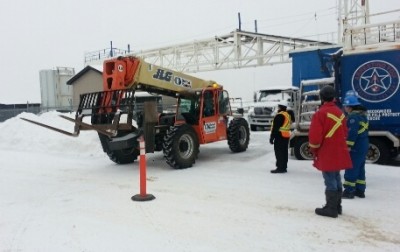
Over the past decade, the number of companies putting their forklift operators through formal training has increased significantly. Part of the reason for this marked increase is the release of beefed up regulations that came into force in the late 90’s across the USA and parts of Canada. However, another major driver in the increase is the financial benefits reaped by employers as cost savings related to unsafe forklift operations become more apparent.
While there is no argument to be made against the aforementioned items as valid reasons for employers to make sure their operators are properly trained it is important to consider that these same reasons do very little to motivate the operators themselves. This is a key issue because just as the best training programs can fall flat without proper supervision and enforcement, the same is doubly so when the drivers do not buy in.
Training, or perhaps more accurately trainers, must not only provide the mechanics and rationale behind safe, proper operation but the motivation to doing things the right way. This is never an easy task but depending on how one chooses to approach it, it can be less difficult.
For example, it is unlikely that the average operator is going to find the inspiration to follow his/her safety training by listening to management’s rhetoric on the enhanced profitability of the company or even worse, the evils of regulatory contravention. Most people find motivation wherever they believe personal benefits may be gained. In other words, the average operator wants to know, what’s in it for me? At least that has been this trainer’s experience.
In order to find out what a given operator considers a personal benefit, the trainer has to get personal. I usually do this by finding out what each operator likes to do during the morning introductions. It not only serves as an icebreaker as I am getting everybody acclimated to the class but also can be very useful motivational material down the road. For instance, during one particular class introductory session I learned that one of the trainee’s granddaughter was graduating from high school in a few weeks. Later that same day this fellow asked, “Why do we need to do all this stupid (expletive deleted)?” I told him it was to make sure that he or anyone else didn’t do something that would get in the way of him seeing his granddaughter graduate. I did not hear from him after that.
This is an example of a simple reply that happened to work, but the point is the reason I gave him to follow his training was personal, not a regulatory wag of the finger or a reminder of how much more money his boss would make. Sometimes, however, it has to go deeper than that. This is where the trainer must be able to provide mentorship through his/her own experiences or the experiences of others.
I have several instances involving personal injuries I have sustained and tragic losses I have endured that are usually powerful enough to sway the hearts and minds of even the most crusty veteran operators, but not everyone is lucky enough, or should I say unlucky enough, to have those. To those trainers out there that do not have a deep enough history within their industries to form a meaningful mentor persona I suggest adopting the experiences of others. Look back through the incident history of your company and pull out any poignant examples you come across that convey a situation where the risk someone took was not worth the reward. Get with operators, first aid attendants, supervisors or long-term coworkers and ask them about what they have seen and/or experienced and how they would go back and do things differently if they could. Trade publications (like the one you are reading right now) often have incident reports, statistical data or articles that illuminate the personal benefits of safety if not the tragic consequences of workplace incidents. Drawing on the experiences of others may not guarantee the desired motivational level in the trainees, but impersonal rhetoric will guarantee the opposite.
Rob Vetter
Director of Training
IVES Training Group
Did you enjoy this article? Sign up for our newsletter to receive more like this!